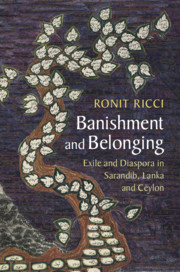Book contents
- Banishment and Belonging
- Asian Connections
- Banishment and Belonging
- Copyright page
- Contents
- Figures
- Maps
- A Note on Orthography and Manuscripts
- Acknowledgments
- Abbreviations
- Maps
- 1 Introduction
- 2 Diasporic Crossings: Malay Writing in Nineteenth-Century Ceylon
- 3 Remembering Java
- 4 “Ceyloned”: The View from the Other Shore
- 5 Exilic Journeys in Time, Place and Writing
- 6 Nabi Adam: The Paradigmatic Exile
- 7 Banishment and Interreligious Encounters: A Malay Ramayana
- 8 Ceylon Malays: Military and Literary Paths
- 9 Malay Writing in Ceylon: Roots and Routes
- Glossary
- Bibliography
- Index
8 - Ceylon Malays: Military and Literary Paths
Published online by Cambridge University Press: 11 November 2019
- Banishment and Belonging
- Asian Connections
- Banishment and Belonging
- Copyright page
- Contents
- Figures
- Maps
- A Note on Orthography and Manuscripts
- Acknowledgments
- Abbreviations
- Maps
- 1 Introduction
- 2 Diasporic Crossings: Malay Writing in Nineteenth-Century Ceylon
- 3 Remembering Java
- 4 “Ceyloned”: The View from the Other Shore
- 5 Exilic Journeys in Time, Place and Writing
- 6 Nabi Adam: The Paradigmatic Exile
- 7 Banishment and Interreligious Encounters: A Malay Ramayana
- 8 Ceylon Malays: Military and Literary Paths
- 9 Malay Writing in Ceylon: Roots and Routes
- Glossary
- Bibliography
- Index
Summary
Although not all Malays in early nineteenth-century Ceylon were associated with the military, as many as 75 percent of Malays served as soldiers in the British colonial army under Governor North. And while this figure was reduced later in the century, the ethos of, and attachment to, military culture remained central to Malay life for at least several decades after the Malay Regiment was disbanded in 1873. Taking this phenomenon as its starting point, this chapter focuses on Malay military affiliation and its links and overlaps with the Malays’ literary culture, including modes of writing as evident in letters, family diaries and manuscript colophons, practices of copying, inscribing, and professing humility, and the role of soldiers in the production and preservation of texts. In addition, the chapter considers perceptions of the Malays as formulated and reflected in writings of the period in Dutch, English, Malay and Sinhala, representing diverse perspectives on Malay life and martial experiences in Ceylon. Finally, the chapter asks how exploring pivotal episodes in Ceylon’s military history – colonialism, the Kandy Wars, the transition between empires – from a Malay vantage point affects the ways this history can be understood.
- Type
- Chapter
- Information
- Banishment and BelongingExile and Diaspora in Sarandib, Lanka and Ceylon, pp. 181 - 217Publisher: Cambridge University PressPrint publication year: 2019



